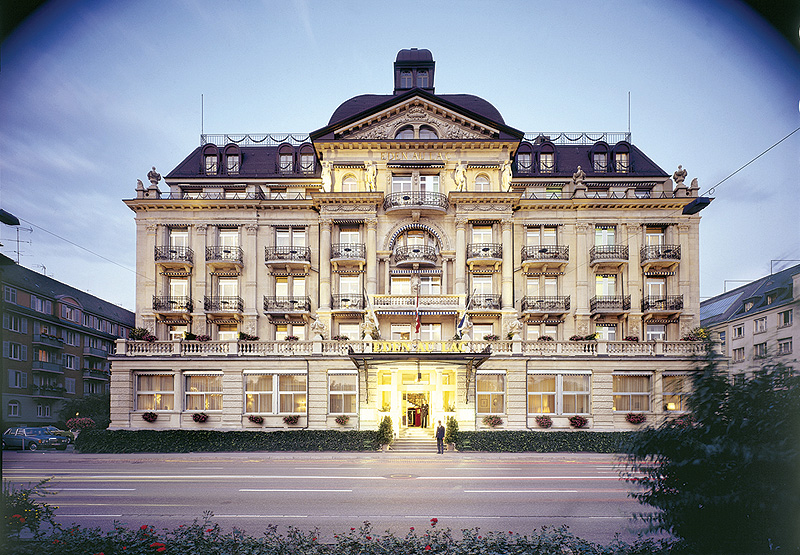
Victoria-Jungfrau Collection
Luxury redefined
The Victoria-Jungfrau Collection has established a benchmark for quality within the Swiss hospitality industry and, with a host of recent developments, looks set to maintain it
The Victoria-Jungfrau Collection (VJC) is a company of four luxury Swiss hotels that began in 1996 when two independent hotels were grouped together: the Victoria-Jungfrau at Interlaken and the Palace in Luzern. The Eden au Lac in Zurich joined VJC in 2005, the Bellevue Palace, located in Berne joined VJC in 2007 to complete group’s current portfolio. Three of these buildings – the Victoria-Jungfrau, Palace and Eden au Lac – are under ownership by the company, whilst it has a management contract for Bellevue Palace. All four hotels are five-star rated and, with a combined history of over 450 years experience in luxury service, have collected many awards throughout their history.
Although the buildings have been around for more than a century, it is important they remain up to date with the comforts they provide. A recent 2.5 million dollar investment by VJC into the hotel at Interlaken saw it opening the new Sensai Select Spa alongside the already existing 5500 square metre ESPA. Beat Sigg, general manager of Eden au Lac and managing director of VJC, explains its recent addition to Victoria-Jungfrau: “Sensai Select Spa is the continued development of the clients’ needs, what they would like to have in addition to what they already get. It uses new Kanebo treatments in order to give it the best quality.”
Further developments were made with the opening of smoking lounges at Victoria-Jungfrau and Bellevue Palace. Beat explains: “What we have done for people who are connoisseurs or who’d like to have a good cigar and cognac after a nice dinner, is build rooms for them. These rooms with special air conditioning, separated from public areas, are called Salon Davidoff in Interlaken and Le Fumoir in Berne.” After a recent ban on smoking in public areas throughout Switzerland, Beat adds that the company felt it necessary to make this service available to its customers: “It is important to offer this because we feel that hoteliers are hosts. If someone would love to smoke and they’ve spent a lot of money coming to the hotel then we should give them the opportunity to do so. We’re not educating people, we want them to have a good time.”
All four VJC hotels also contain high quality restaurants, a service which Beat feels is important to the fortunes of the company: “We cater for an international clientele but we consider ourselves Swiss hotels, and this is especially important in food and beverage. We feature a lot of Swiss wines, for example and food-wise we have a lot of local specialities. This authenticity is a very important factor of success for the hotels.” Due to the individual nature of the hotels, each one has its own distinct menu. The head chef has freedom in creating the menu but, because of the company’s emphasis on quality, they must discuss a menu with VJC and prove its worth before it is agreed.
VJC do occasionally unite the menus and chefs of all four hotels, as Beat illustrates: “We hold functions where we say, ‘four hotels, four chefs, one menu’. When the four chefs first got together they realised that one is best at pastries, one at sauces and so on, so they created a menu that all four of them were cooking. It is a tremendous success.”
Despite recent economic problems the company has maintained composure and is even investing in a complete makeover of its hotel in Berne. This 12.5 million dollar renovation project has required the closing of the entire hotel for four weeks and it will be reopened on 25th July. Beat explains this as part of the company’s commitment to modern comforts and the best possible service: “The hotel is more than 100 years old and things have not been redone completely in the past, just added to or altered. We found time to really look at it and renovate it. It has been under preparation for one and a half years and finally we are doing it.”
The company also has a staff development programme it is particularly proud of, as he highlights: “This is very big. We consider ourselves as one of the best training locations for people involved in Swiss hospitality. The people that take an apprenticeship with us are usually among the top graduates. For them we have an internal training programme and a training manager specifically for that purpose. We are really focusing on it.”
The future for VJC looks to be prosperous. Although it doesn’t have plans to acquire further hotels, Beat explains that it is not something the company has ruled out: “Basically we are not in a hurry but I definitely think we are in a position to manage more than just four hotels. We are looking around and we have been approached quite often, but we are very careful about our choices.” He concludes with a positive outlook: “So far the company has been growing by opportunity and we will continue to do so.”